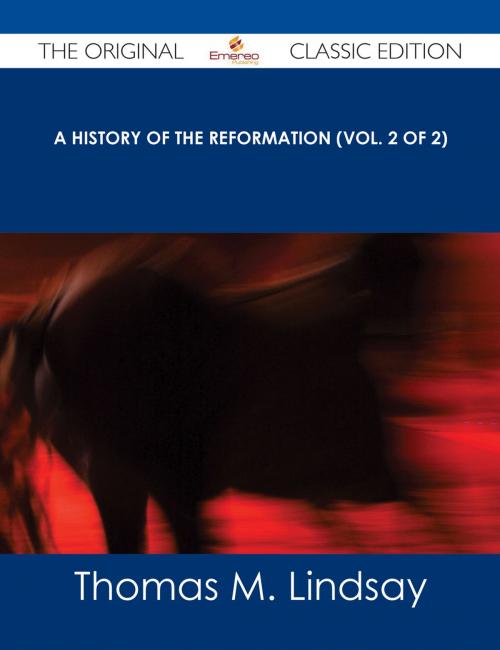A History of the Reformation (Vol. 2 of 2) - The Original Classic Edition
Nonfiction, Reference & Language, Reference, Fiction & Literature| Author: | Thomas M. Lindsay | ISBN: | 9781486445059 |
| Publisher: | Emereo Publishing | Publication: | March 18, 2013 |
| Imprint: | Emereo Publishing | Language: | English |
| Author: | Thomas M. Lindsay |
| ISBN: | 9781486445059 |
| Publisher: | Emereo Publishing |
| Publication: | March 18, 2013 |
| Imprint: | Emereo Publishing |
| Language: | English |
Finally available, a high quality book of the original classic edition of A History of the Reformation (Vol. 2 of 2). It was previously published by other bona fide publishers, and is now, after many years, back in print.
This is a new and freshly published edition of this culturally important work by Thomas M. Lindsay, which is now, at last, again available to you.
Get the PDF and EPUB NOW as well. Included in your purchase you have A History of the Reformation (Vol. 2 of 2) in EPUB AND PDF format to read on any tablet, eReader, desktop, laptop or smartphone simultaneous - Get it NOW.
Enjoy this classic work today. These selected paragraphs distill the contents and give you a quick look inside A History of the Reformation (Vol. 2 of 2):
Look inside the book:
While it may be said with perfect truth that the churchly ideal in the minds of the leaders in most of the Reformed Churches was to restore the theocratic democracy of the early centuries, and that this was a strong point of contrast between them and Luther, who insisted that the jus episcopale belonged to the civil magistrate, in practice the secular authorities in Switzerland, the Netherlands, the Palatinate, etc., kept almost as tight a hold on the Reformed national Churches as did the Lutheran princes and municipalities. ...One has only to compare the Bishops’ Book and the King’s Book of the Henrican period in England with the many statements Erasmus has made about the kind of reformation he desired to see, to recognise that they were meant to serve for a reformation in life and morals which would leave untouched the fundamental doctrinal system of the mediæval Church and its organisation in accordance with the principles laid down by the great Humanist. ...But if originality be the gift to seize, to combine into one organic whole, separate isolated truths, to see their bearing upon the practical religious life of all men, educated and ignorant, to use the new light to strip the common religious life of all paralysing excrescences, to simplify it and to make it clear that the sum and essence of Christianity is “unwavering trust of the heart in Him who has given Himself to us in Christ Jesus as our Father, personal assurance of faith because Christ with His work undertakes our cause,” and to do all this with the tenderest sympathy for every true dumb religiousPg 16 instinct which had made men wander away from the simplicity which is in Christ Jesus, then Luther stands alone in his day and generation, unapproachable by any other.
Finally available, a high quality book of the original classic edition of A History of the Reformation (Vol. 2 of 2). It was previously published by other bona fide publishers, and is now, after many years, back in print.
This is a new and freshly published edition of this culturally important work by Thomas M. Lindsay, which is now, at last, again available to you.
Get the PDF and EPUB NOW as well. Included in your purchase you have A History of the Reformation (Vol. 2 of 2) in EPUB AND PDF format to read on any tablet, eReader, desktop, laptop or smartphone simultaneous - Get it NOW.
Enjoy this classic work today. These selected paragraphs distill the contents and give you a quick look inside A History of the Reformation (Vol. 2 of 2):
Look inside the book:
While it may be said with perfect truth that the churchly ideal in the minds of the leaders in most of the Reformed Churches was to restore the theocratic democracy of the early centuries, and that this was a strong point of contrast between them and Luther, who insisted that the jus episcopale belonged to the civil magistrate, in practice the secular authorities in Switzerland, the Netherlands, the Palatinate, etc., kept almost as tight a hold on the Reformed national Churches as did the Lutheran princes and municipalities. ...One has only to compare the Bishops’ Book and the King’s Book of the Henrican period in England with the many statements Erasmus has made about the kind of reformation he desired to see, to recognise that they were meant to serve for a reformation in life and morals which would leave untouched the fundamental doctrinal system of the mediæval Church and its organisation in accordance with the principles laid down by the great Humanist. ...But if originality be the gift to seize, to combine into one organic whole, separate isolated truths, to see their bearing upon the practical religious life of all men, educated and ignorant, to use the new light to strip the common religious life of all paralysing excrescences, to simplify it and to make it clear that the sum and essence of Christianity is “unwavering trust of the heart in Him who has given Himself to us in Christ Jesus as our Father, personal assurance of faith because Christ with His work undertakes our cause,” and to do all this with the tenderest sympathy for every true dumb religiousPg 16 instinct which had made men wander away from the simplicity which is in Christ Jesus, then Luther stands alone in his day and generation, unapproachable by any other.















